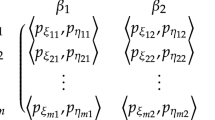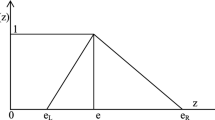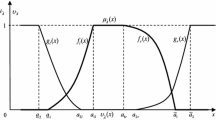Abstract
In many real games, two players’ payoffs are not exactly opposite and players often have some constraints or preference on their strategies. Such kinds of games are called constrained bi-matrix games (CBGs) for short. Based on dual programming theory, two linear programming models are developed for solving any CBG. Then, a classic example of bi-matrix games called the Rock-scissors-cloth game with considering players’ preference on strategies is used to show the validity of the proposed models and method. Furthermore, we investigate on the CBGs with payoffs represented by intuitionistic fuzzy numbers, which are simply called intuitionistic fuzzy CBGs in which both the ambiguity of the payoffs and the constraints of the strategies are taken into account. At last, the effectiveness of the proposed models and method is demonstrated with a numerical example of the company development strategy choice problem.
Similar content being viewed by others
References
Babayigit, C., Rocha, P., Das, T.K.: A two-tier matrix game approach for obtaining joint bidding strategies in FTR and energy markets. IEEE Trans. Power Syst. 25(3), 1211–1219 (2010)
Bhurjee, A.K., Panda, G.: Optimal strategies for two-person normalized matrix game with variable payoffs. Oper. Res. 17(2), 547–562 (2017)
Liu, T., Deng, Y., Chan, F.: Evidential supplier selection based on DEMATEL and game theory. Int. J. Fuzzy Syst. 20(2), 1–13 (2017)
Chen, L., Peng, J., Liu, Z., Zhao, R.: Pricing and effort decisions for a supply chain with uncertain information. Int. J. Prod. Res. 55(1), 264–284 (2017)
Nash, J.: Non-cooperative games. Ann. Math. 54(2), 286–295 (1951)
Knuth, D.E., Papadimitriou, C.H., Tsitsiklis, J.N.: A note on strategy elimination in bimatrix games. Oper. Res. Lett. 7(3), 103–107 (1988)
Kontogiannis, S.C., Panagopoulou, P.N., Spirakis, P.G.: Polynomial algorithms for approximating Nash equilibria of bimatrix games. Theor. Comput. Sci. 410(17), 1599–1606 (2009)
Li, D.F.: Linear programming approach to solve interval-valued matrix games. Omega 39(6), 655–666 (2011)
Chakeri, A., Sheikholeslam, F.: Fuzzy Nash equilibriums in crisp and fuzzy games. IEEE Trans. Fuzzy Syst. 21(1), 171–176 (2013)
Liu, S.T., Kao, C.: Matrix games with interval data. Comput. Ind. Eng. 56(4), 1697–1700 (2009)
Li, D.F.: A fast approach to compute fuzzy values of matrix games with payoffs of triangular fuzzy numbers. Eur. J. Oper. Res. 223(2), 421–429 (2012)
Nishizaki, I., Sakawa, M.: Equilibrium solutions in multiobjective bimatrix games with fuzzy payoffs and fuzzy goals. Fuzzy Sets Syst. 111(1), 99–116 (2000)
Maeda, T.: Characterization of the equilibrium strategy of the bimatrix game with fuzzy payoff. J. Math. Anal. Appl. 251(2), 885–896 (2000)
Pang, J.H., Zhang, Q.: The equilibrium strategies of bi-matrix games with interval-valued payoffs. Syst. Eng. 25(4), 114–118 (2007)
An, J.J., Li, D.F., Nan, J.X.: A mean-area ranking based non-linear programming approach to solve intuitionistic fuzzy bi-matrix games. J. Intell. Fuzzy Syst. 33(1), 563–573 (2017)
Nan, J.X., Li, D.F., An, J.J.: Solving bi-matrix games with intuitionistic fuzzy goals and intuitionistic fuzzy payoffs. J. Intell. Fuzzy Syst. 33(6), 3723–3732 (2017)
Fei, W., Li, D.F.: Bilinear programming approach to solve interval bimatrix games in tourism planning management. Int. J. Fuzzy Syst. 18(3), 504–510 (2016)
Niknam, T.: A new fuzzy adaptive hybrid particle swarm optimization algorithm for non-linear, non-smooth and non-convex economic dispatch problem. Appl. Energy 87(1), 327–339 (2010)
Tsekouras, G.E., Tsimikas, J., Kalloniatis, C.: Interpretability constraints for fuzzy modeling implemented by constrained particle swarm optimization. IEEE Trans. Fuzzy Syst. 26(4), 2348–2361 (2018)
Ghodousian, A., Babalhavaeji, A.: An efficient genetic algorithm for solving nonlinear optimization problems defined with fuzzy relational equations and max-Lukasiewicz composition. Appl. Soft Comput. 69, 475–492 (2018)
Charnes, A.: Constrained games and linear programming. Proc. Natl. Acad. Sci. USA 39(7), 639–641 (1953)
Charnes, A., Sorensen, S.: Constrained n-person games. Int. J. Game Theory 3(3), 141–158 (1974)
Penn, A.: Generalized lagrange-multiplier method for constrained matrix games. Oper. Res. 19(4), 933–945 (1971)
Li, D.F., Cheng, C.T.: Fuzzy multiobjective programming methods for fuzzy constrained matrix games with fuzzy numbers. Int. J. Uncertain. Fuzz. 10(4), 385–400 (2002)
Li, D.F., Hong, F.X.: Solving constrained matrix games with payoffs of triangular fuzzy numbers. Comput. Math. Appl. 64(4), 432–446 (2012)
Firouzbakht, K., Noubir, G., Salehi, M.: Constrained bimatrix games in wireless communications. IEEE Trans. Commun. 64(1), 1–11 (2015)
Meng, F.Y., Zhan, J.Q.: Two methods for solving constrained bi-matrix games. Open Cybern. Syst. J. 8, 1038–1041 (2014)
Zadeh, L.A.: Fuzzy sets. Inf. Control 8(3), 338–353 (1965)
Atanassov, K.T.: Intuitionistic fuzzy sets. Fuzzy Sets Syst. 20(1), 87–96 (1986)
Zadeh, L.A.: The concept of a linguistic variable and its application to approximate reasoning-I. Inf. Sci. 8(3), 199–249 (1975)
Miyamoto, S.: Remarks on basics of fuzzy sets and fuzzy multisets. Fuzzy Sets Syst. 156(3), 427–431 (2005)
Atanassov, K.T.: Interval valued intuitionistic fuzzy sets. Fuzzy Sets Syst. 31(1), 343–349 (1989)
Nash, J.F.: Equilibrium points in n-person games. Proc. Natl. Acad. Sci. USA 36(1), 48–49 (1950)
Li, D.F.: Decision and Game Theory in Management with Intuitionistic Fuzzy Sets. Springer, Berlin (2014)
Nan, J.X., Li, D.F., Zhang, M.J.: A lexicographic method for matrix games with payoffs of triangular intuitionistic fuzzy numbers. Int. J. Comput. Int. Syst. 3(3), 280–289 (2010)
Yu, V.F., Van, L.H., Dat, L.Q.: Analyzing the ranking method for fuzzy numbers in fuzzy decision making based on the magnitude concepts. Int. J. Fuzzy Syst. 19(5), 1–11 (2017)
Varghese, A., Kuriakose, S.: Centroid of an intuitionistic fuzzy number. Notes Intuit. Fuzzy Sets 18(1), 19–24 (2012)
Hung, W.L., Yang, M.S.: Similarity measures of intuitionistic fuzzy sets based on hausdorff distance. Pattern Recognit. Lett. 25(14), 1603–1611 (2004)
Author information
Authors and Affiliations
Corresponding author
Rights and permissions
About this article
Cite this article
An, JJ., Li, DF. A Linear Programming Approach to Solve Constrained Bi-matrix Games with Intuitionistic Fuzzy Payoffs. Int. J. Fuzzy Syst. 21, 908–915 (2019). https://doi.org/10.1007/s40815-018-0573-5
Received:
Revised:
Accepted:
Published:
Issue Date:
DOI: https://doi.org/10.1007/s40815-018-0573-5




